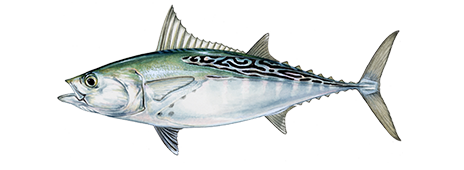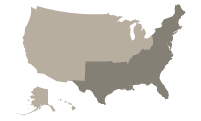
Little Tunny
The little tunny is a pelagic, schooling, migratory species that can be found in very large schools.

Region
South, Northeast
Catch ease
Easy
Habitat
Bay, Ocean
How to identify a Little Tunny
It is most easily distinguished from similar species by its markings. It has a scattering of dark spots resembling fingerprints between the pectoral and ventral fins that are not present on any related Atlantic species. It also has wavy, “worm-like” markings on the back. These markings are above the lateral line within a well marked border, and never extend farther forward than about the middle of the first dorsal fin. The markings are the same as in the closely related Pacific kawakawa but are unlike those of any other Atlantic species.
Where to catch Little Tunny
The little tunny occurs in tropical and warm temperate waters of the Atlantic Ocean from the southern New England states and Bermuda to Brazil and from South Africa to Biscay or Great Britain. They are also in the Mediterranean. Flocks of diving seabirds are often indicative of the presences of a school of little tunny, which may consist of many thousands of individuals. Because this species feeds on small pelagic fishes near the surface, any school feeding action tends to attract and excite birds. The following list includes additional details on where to catch this fish:
| Baitfish Patches |
| Birds |
| Floating Foam and Debris |
| Night Fishing |
| Ripples, Currents, Swirls and Sprays |
| The Open Ocean |
| Bays and Estuaries |
| Coastal Waters |
| Merging Water |
| Reefs, Wrecks, and Shoals |
| Rocky Sea Floor |
How to catch Little Tunny
Fishing methods include trolling or casting from boats using small whole baits, strip baits, or small lures such as spoons, plugs, jigs, and feathers. A few little tunny may be caught from shore. The dark flesh is esteemed by some and disdained by others. Often times, the little tunny is used for chum, strip baits, or as a trolled live or dead bait. The following are fishing methods used to catch this fish:
Little Tunny lures, tackle & bait
The following are lures, tackle or bait that can be used to catch this fish:
